|
|
|
Sort Order |
|
|
|
Items / Page
|
|
|
|
|
|
|
| Srl | Item |
| 1 |
ID:
168390
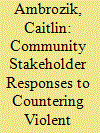

|
|
|
|
|
| Summary/Abstract |
In the United States, despite federal efforts to empower communities to form local governance networks to develop and implement collaborative countering violent extremism (CVE) programs, local CVE governance networks are rare. Why do CVE governance networks emerge within only some communities? I argue that three factors—interest in CVE, capacity to participate, and facilitation—determine the prospects for the emergence of a CVE governance network within a community. The article uses a matching technique to identify and compare the community stakeholder responses to CVE in two communities—Houston, TX and Columbus, OH. Survey research of stakeholders who participated in Houston and stakeholders most likely to participate in Columbus but did not highlights the importance of the three factors. By focusing on these drivers of collaborative governance, the article provides an explanation for the lack of CVE collaboration in the United States.
|
|
|
|
|
|
|
|
|
|
|
|
|
|
|
|
| 2 |
ID:
194868


|
|
|
|
|
| Summary/Abstract |
There is still little discussion on how community-based organizations (CBOs) may help counter violent extremism (CVE) in Nigeria. This research explores the implications of CBOs’ use of external networks for CVE and the distribution of humanitarian aid in North-East Nigeria. It finds that because CBOs depend so heavily on outside funding, they are constantly exposed to the demands and whims of donors. We therefore urge the government to prioritize CBOs in CVE programmes and operations to reduce external influence and to limit the spread of violent extremism in the region.
|
|
|
|
|
|
|
|
|
|
|
|
|
|
|
|
| 3 |
ID:
163700
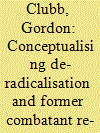

|
|
|
|
|
| Summary/Abstract |
Nigeria has recently joined the many states which have established de-radicalisation programmes. The article engages with debates on how the success of de-radicalisation can be ascertained given the substantial flaws of using individual-oriented recidivism rates as a measure. Many studies on de-radicalisation emphasise the need to consider the programme’s context to facilitate success, yet ‘context’ has been under-conceptualised and approached statically. The paper provides greater agency to ‘the context’ in distinguishing between the type of milieus former combatants are re-integrated into and how these emergent social relations shape the scope of de-radicalisation programmes, beyond the traditional over-emphasis on programme participant outcomes as measures of success. The Nigerian de-radicalisation programme has a broader function insofar as it provides former combatants with ‘scripts’ of disengagement and function as a brand, signalling to communities that former combatants have repented and are ‘better citizens, imbued with genuine nationalism’ that resonate with local communities.
|
|
|
|
|
|
|
|
|
|
|
|
|
|
|
|
| 4 |
ID:
152014
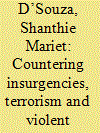

|
|
|
|
|
| Summary/Abstract |
South Asia continues to remains a hotbed of various forms of extremism. Indiscriminate violent terrorism with a strong religious overtone claims the highest number of victims, most notably in Pakistan and India. Islamist Jihadi movements backed by external actors keep the state of Jammu and Kashmir on a boil. Globally inspired Jihad in search of a shariah-ruled state has recurrently raised its head in Bangladesh. Linkages with global jihad and movements that have rallied support to an anti-West platform have escalated their violence potential. They remain a threat not just to the region but have demonstrated an inclination to network with groups having a trans-regional agenda.
|
|
|
|
|
|
|
|
|
|
|
|
|
|
|
|
| 5 |
ID:
188047
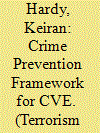

|
|
|
|
|
| Summary/Abstract |
CVE is a diverse policy space involving efforts to build cohesive communities, support young people who are vulnerable to radicalization, and deradicalize convicted terrorism offenders. Recently, the public health model of disease prevention has become an influential framework for understanding these diverse components. In this paper, I argue that crime prevention should be preferred as a conceptual framework for CVE. I offer a criminological framework encompassing situational prevention, developmental prevention, community crime prevention, third-party policing and procedural justice policing. I develop these concepts into an agenda for crime prevention research in CVE. I also briefly outline some of the lessons that the evidence base from criminology may provide when designing CVE programs and policy.
|
|
|
|
|
|
|
|
|
|
|
|
|
|
|
|
| 6 |
ID:
188378
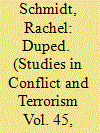

|
|
|
|
|
| Summary/Abstract |
In narratives around insurgencies, terrorism, and other forms of political violence, the media—and policymakers—frequently portray women as victims or unintelligent pawns of men. But these violent women get more media attention than their male counterparts because they are a shocking departure from gendered expectations of nurturing, peaceful women. However, even such narratives of deviance can reinforce societal stereotypes about women by emphasizing that they are emotional but not political, easily manipulated, often deranged, or simply unintelligent. Using in-depth interviews in Ireland and the United Kingdom with practitioners in counter terrorism (CT) and countering violent extremism (CVE), this paper argues that a failure to ask meaningful questions about women’s roles in extremist violence has reinforced gender stereotypes, leading to disengagement and deradicalization practices that ignore or downplay women’s importance in fostering violence.
|
|
|
|
|
|
|
|
|
|
|
|
|
|
|
|
| 7 |
ID:
191034


|
|
|
|
|
| Summary/Abstract |
There currently exists little evidence on the effectiveness of case-managed programs targeting radicalised individuals. This paper provides results from an evaluation of two case-managed interventions implemented by police in Australia, referred to as Intervention 1 and Intervention 2. Drawing on client case note data and interviews, the paper provides quantitative and qualitative results. It examines client change using a five-point metric and details two individual case studies. Results provide data on radicalised behaviours, intervention goals and services offered to clients. Individual client progress is explored, and the overall effectiveness of both programs examined. The results show a positive relationship between client change and different measures of engagement. Limitations of the evaluation methodology and data sources are acknowledged and addressed. Lessons are highlighted relating to the assessment of client change, program evaluation and the role of interventions in supporting disengagement.
|
|
|
|
|
|
|
|
|
|
|
|
|
|
|
|
| 8 |
ID:
169936


|
|
|
|
|
| Summary/Abstract |
Utilizing a sample drawn to represent the general U.S. population, the present study experimentally tested whether a call-center’s disclaimer regarding limits to caller confidentiality (i.e., that operators would be required to refer calls to law enforcement if callers were to discuss anyone who was a danger to themselves or others) affected disclosures related to a third party’s involvement with terrorist groups, gangs, or such party’s commission of assault and/or non-violent crimes.
|
|
|
|
|
|
|
|
|
|
|
|
|
|
|
|
| 9 |
ID:
132174


|
|
|
|
|
| Publication |
2014.
|
| Summary/Abstract |
The United States government has adopted new approaches to counter violent extremist organizations around the world. "Soft security" and development programs include focused educational training for groups vulnerable to terrorist recruitment, norm messaging through local radio programming, and job creation in rural communities. This article evaluates the effectiveness of one set of these multi-vectored, community-level programs through data from 200 respondents in two similar, neighboring towns in northern Mali, Africa. The data show that residents in Timbuktu who were exposed to the programming for up to five years displayed measurably altered civic behavior and listening patterns in comparison with their counterparts in the control town of Diré, which had no programming (controlling for potential covariates including age, ethnicity, and political and socioeconomic conditions). However, there was little measurable difference between the groups in terms of their cultural identities and attitudes towards the West. While this study is unable to definitively prove a causal connection between programming and behavioral outcomes, it nonetheless strongly suggests that the process of "winning hearts and minds" can be effective at certain levels but may require extended time and dedicated resources to generate higher-level results.
|
|
|
|
|
|
|
|
|
|
|
|
|
|
|
|
| 10 |
ID:
193147
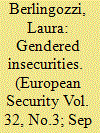

|
|
|
|
|
| Summary/Abstract |
What kind and whose security is the European Union concerned with in its gender practices in countering violent extremism? This article contributes to the scholarship on EU implementation of the Women, Peace and Security agenda and gender in countering violent extremism, highlighting shortcomings in the conceptualisation and practice of women’s participation in the security sphere. Taking Niger as a heuristic case study, the paper explores tensions between local gender norms and EU securitised framing of women’s empowerment and gender equality, arguing that women’s increased participation in the security field is tacitly understood in terms of use-value. Building on feminist postcolonial scholarship, the analysis uncovers how women are included and what expectations they are deriving from their engagement, exposing the neoliberal and neocolonial framings of EU intervention and the misunderstandings of women’s materialities. By ontologically flattening women subjectivities without accounting for their intersectional experiences, both patriarchy and global hierarchies of knowledge production are reiterated. In doing so, the EU co-constructs gendered and racialised subjects, thus reinforcing inequalities, silencing local pluralities, and in many cases, aggravating women’s situation of insecurity in Niger. The analysis employs feminist and ethnographic methods, including semi-structured interviews and participant observation.
|
|
|
|
|
|
|
|
|
|
|
|
|
|
|
|
| 11 |
ID:
178200
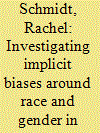

|
|
|
|
|
| Summary/Abstract |
A growing body of research on terrorism and countering violent extremism (CVE) has increasingly questioned the lack of attention to—and myths around—women involved in extremist and political violence, while other research has drawn attention to racial and religious stereotypes that affect national security policies and practices worldwide. While Canada is often heralded as a global leader in multiculturalism and gender equality, the nation’s national security sector still faces significant challenges around implicit biases related to race and gender. This study asks whether gender and racial stereotypes impeding counterterrorism and CVE in other countries are also affecting policies and practices in Canada. Using twenty-six in-depth interviews with practitioners, police officers, academics, and government officials from seven major cities across Canada, this paper argues that persistent gender and racial stereotypes are indeed a key challenge impeding Canada’s efforts to adequately address radicalization into and disengagement from extremist violence.
|
|
|
|
|
|
|
|
|
|
|
|
|
|
|
|
| 12 |
ID:
179953
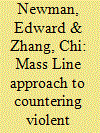

|
|
|
|
|
| Summary/Abstract |
As a strategy to temper centralized governance with a degree of public participation in China, the “Mass Line” approach has been used throughout the history of the Chinese Communist Party (CCP) to mobilize citizens in support of national projects and use this engagement as a channel for feedback. The Mass Line has been employed in attempts to address “radicalization” and challenges to centralized state control, indicating that the CCP’s approach to counter-terrorism goes beyond the top-down, oppressive tactics that China is often associated with. This paper explores China’s programmes of mass mobilization as a part of its counter-radicalization strategy in order to deepen understanding of how the country is responding to a key security challenge. It demonstrates that this approach reflects significant historical continuities, and thus national characteristics, in terms of political culture and state control.
|
|
|
|
|
|
|
|
|
|
|
|
|
|
|
|
| 13 |
ID:
138402


|
|
|
|
|
| Summary/Abstract |
On March 28, 2015, Nigerians returned to the polls to elect a president for the fourth time since the 1999 democratic transition. Nigeria’s Fourth Republic (1999-present) has lasted far longer than any previous attempt at civilian rule in this country of more than 175 million, encompassing an era of both remarkable growth (following a 2014 recalculation of GDP with more inclusive data, it officially surpassed South Africa as the continent’s largest economy) and worrisome social conflict. Indeed, it is possible to see Nigeria as both a rapidly modernizing success story and a deeply troubled state in which more than 35,000 citizens have died in politically motivated violence over the past four years. While its foreign direct investment inflows ($5.6 billion in 2013) put it in the company of advanced nations like France and Japan, it joins Syria, Iraq, Pakistan, and Afghanistan in a group of five countries that accounts for 80 percent of the world’s deaths from terrorism.
|
|
|
|
|
|
|
|
|
|
|
|
|
|
|
|
| 14 |
ID:
184115


|
|
|
|
|
| Summary/Abstract |
National approaches to prevent terrorism, extremism, and radicalisation have changed considerably over the last decades. Previous studies mapping these changes have primarily relied on empirical analyses of formal policy and political processes. This case-study of Sweden takes an alternative route, and analyses a dataset of 1405 Swedish newspaper articles (1985–2019) using a new institutional theory and social movement theory framework. Therethrough, the paper is able to provide new insights into the emergence and development of an institutional issue field concerned with the prevention of terrorism, extremism, and radicalisation. More specifically, the paper highlights the unstable, fragmented, dynamic and contested character of the field’s development. Frames containing the problems and solutions considered most important during each of the field’s five stages are identified, and the subsequent institutional and organisational consequences are discussed. The paper also considers how terror attacks and other extremism-related events impact the institutionalisation and alternation of dominant frames, and identifies the translation and development of an inclusive vocabulary as pivotal to mobilising a broad and diverse set of actors to co-produce preventive efforts.
|
|
|
|
|
|
|
|
|
|
|
|
|
|
|
|
| 15 |
ID:
178920


|
|
|
|
|
| Summary/Abstract |
The term “countering violent extremism” (CVE) refers to a suite of proactive actions to counter efforts by extremists to recruit, radicalize, and mobilize followers to violence, and thus prevent extremist violence from occurring. In this article we explore the ethics of CVE. We begin with a description of CVE, framed within a discussion of the history (and issues) with counter-terrorism efforts post 9/11. We also outline the many and varied techniques and practices that the term CVE describes. We argue that the fundamental ethical tension in many of these forms of CVE is between the purported benefits of addressing the conditions that most likely contribute to recruitment and radicalization by violent extremists; and the potential risks of upstream interventions that might unfairly target communities and individuals or produce counterproductive outcomes. We then mount a defense of CVE on ethical grounds. Drawing from literature in public health ethics, we argue that violent extremism is a “social contagion” that shares relevant features with infectious diseases that motivate arguments for publicly-funded and even enforceable vaccination schedules. CVE is justified, we argue, to the degree it is necessary, effective, proportionate, minimally infringing on individual rights, and subject to public accountability. We assess these criteria and demonstrate that, while there are cases in which CVE is performed in an unjustifiable manner, the practice itself is in principle justified. This article concludes with an applied test of the model on a newly formed CVE program in the United States.
|
|
|
|
|
|
|
|
|
|
|
|
|
|
|
|
| 16 |
ID:
114338
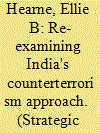

|
|
|
|
|
| Publication |
2012.
|
| Summary/Abstract |
This article looks at the status quo of Indian counterterrorism policy-which largely favours 'physical' or 'hard' measures-and proposes that the government adopt a more holistic strategy. Termed 'Countering Violent Extremism', this would involve measures geared towards long-term prevention, with greater attention paid to the reasons for which people commit terrorism and to the impact of counterterrorism on communities. As such, the article focuses on 'counterradicalisation' (society-wide prevention), 'deradicalisation' (a nuanced response to convicted terrorists) and uses Islamism as a case study, with the proviso that many 'countering violent extremism measures' can also be applied successfully to other types of violent extremism.
|
|
|
|
|
|
|
|
|
|
|
|
|
|
|
|
| 17 |
ID:
187147
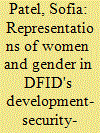

|
|
|
|
|
| Summary/Abstract |
In a post-9/11 environment, the Department for International Development (DFID) shifted its strategic focus towards an integrationist approach that aligned mainstream development programming with the national security agenda. A key part of those reforms was integrating counterterrorism – directly and indirectly – into DFID's portfolio. Using a feminist institutionalist approach, I examine how discourses about women, development, security, and counterterrorism are reproduced through a ‘development-security-counterterrorism nexus’. Within the nexus, DFID represents a key site for the production, reproduction, and evolution of gendered discursive practices1 about women. I argue that institutional evolution is possible through a process of discursive evolution where certain discourses become more or less engrained or ‘sedimented’2 depending on the presence of alternative ideas and knowledges. The central research question asks how did gender-sensitive development work evolve after 9/11 and what factors influenced and shaped this evolution? The main findings were that as counterterrorism aims, objectives, and methods became more emphasised in UK development programming, a sense of institutional incoherence and poor strategic direction adversely affected how gender-sensitive programming was designed and implemented. Furthermore, I conclude that gendered development policy was largely based on assumptions rather than evidence, which negatively impacted how programmes were implemented.
|
|
|
|
|
|
|
|
|
|
|
|
|
|
|
|
| 18 |
ID:
194402


|
|
|
|
|
| Summary/Abstract |
Women and children returning from areas formerly controlled by the Islamic State typically have experienced high levels of trauma and indoctrination, further complicating politically fraught efforts at reintegration and resettlement. Consequently, countries around the world are grappling with how best to manage the return of these women and children. To help better understand which types of programming can contribute to the successful, non-violent reintegration of these individuals, we incorporated ideas from existing Repatriation and Rehabilitation (R&R) literature, field practitioners, R&R subject matter experts, and literature from adjacent fields (e.g., refugee resettlement, criminal justice, psychological resilience) into a recommended best practice approach to supporting returning women and children. We propose a shift from “R&R” programming to what we call the “5R” framework: Repatriation/Resettlement, Reintegration, Rehabilitation, and Resilience. This shift provides conceptual clarity related to how different program elements target proximal goals (e.g., wellbeing and personal safety, belonging and opportunity, non-violence, and dignity), and how programming can shift from more centrally- and government-held services to informal and community-based supports.
|
|
|
|
|
|
|
|
|
|
|
|
|
|
|
|
| 19 |
ID:
163204
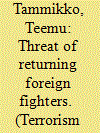

|
|
|
|
|
| Summary/Abstract |
The conflict in Syria and Iraq from 2011 onwards, and the Spanish Civil War in 1936–39 both witnessed a very relevant foreign fighter phenomenon. Even if the ideological drivers were different, both phenomena had a huge impact internationally on how foreign fighters were perceived as a threat in their home countries. In this article the official state responses to the two waves of foreign fighters have been compared with respect to the Finnish context. The volunteers in the Spanish conflict were regarded a security threat upon their return, since it was estimated that they might provide added expertise to the revolutionary left-wing movements in Finland. The returning volunteers from Syria-Iraq have not been perceived as a revolutionary threat to the Finnish political system, but as potential terrorists attacking the civilian population. After comparing different political contexts, it can be argued that the domestic political situation has in both cases had an impact on how the threats were answered in practice. Since the foreign fighters in Spain had significant political support among the growing left-wing parties, the Finnish state response towards them remained vague. In the Syria-Iraq case there has been no political support for the foreign fighters, and the issue has been effectively securitized.
|
|
|
|
|
|
|
|
|
|
|
|
|
|
|
|
| 20 |
ID:
155717
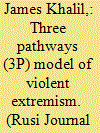

|
|
|
|
|
| Summary/Abstract |
Prominent frameworks relating to terrorism and violent extremism, including that developed by the NYPD and the popular ‘pyramid’ and ‘staircase’ analogies, tend to oversimplify or neglect the diversity of routes that individuals travel to violence. The Three Pathways (3P) model developed by James Khalil contributes to theory, and provides an effective lens through which policymakers and implementers can evaluate their current and future preventive countermeasures under the countering and preventing violent extremism frameworks.
|
|
|
|
|
|
|
|
|
|
|
|
|
|
|
|
|
|
|
|
|